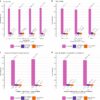A large, longitudinal study in Canada has unequivocally refuted the idea that epidural anesthesia increases the risk of autism in children. Among more than 120,000 vaginal births, researchers found no evidence for any genuine link between this type of pain medication and autism spectrum disorder.
The notion was first put forward last year in a study of Southern California hospitals. The results were immediately met with skepticism and “strenuous concerns” by thousands of obstetricians, gynecologists, anesthesiologists, and experts in maternal-fetal medicine.
Because the research was retrospective, it could not confirm causation, and doctors were quick to point out just how many confounding factors were unaccounted for.
“Why the authors excluded women in labor who required Caesarean delivery is not explained,” the UK Royal College of Anaesthetists wrote at the time.
“We know that babies born by Caesarean section have a higher rate of autism, but they could have controlled for this in their analysis. This exclusion means that probably 30-35 percent of women who birthed during this period were not analyzed.”
A letter to the editor of the journal at the time also pointed out that minimal doses of local anesthetic are insufficient to cause neural toxicity, and that longer labors and maternal fevers, which are possible confounding factors, were utterly ignored.
“Our serious contention with this study is the danger of misinterpretation by women making decisions about their choices for labor pain relief,” reads the letter, written by a team of anesthesiology and obstetrics researchers.
“Similar to persistent skepticism related to the safety of vaccines, we are concerned that it may be difficult to reverse false notions, even with contradictory scientific evidence.”
Now, we have a much clearer picture of what’s going on.
In a new study, researchers from Canada have put together a much more detailed analysis, adjusting for a long list of possible contributing factors previously overlooked – including maternal age, socioeconomic status, pre-pregnancy covariates like diabetes, hypertension, and depression.
Pregnancy-related covariates, were also considered, including fetal distress, maternal medication, drug use, and induced births.
Among all the live births delivered in a hospital from 2005 to 2016 – more than 123,000 births in total – the new findings suggest there is no association between epidural exposure and an increased offspring risk of ASD.
Even when the authors compared siblings, one of whom had been birthed with epidural and the other without, they found no significant link.
“That makes us really confident in how robust our results were,” says statistician and health policy researcher Elizabeth Wall-Wieler from the University of Manitoba.
“The vast majority of evidence around epidurals, including that from our new study, shows that they are the most effective means of providing pain relief to women during labor and that serious complications are rare.”
Epidurals also come with several under-appreciated benefits beyond pain relief. Epidural is given during labor via an in-dwelling catheter in the spinal cord, which means if an unexpected and urgent cesarean section is needed, pain relief is already provided – and this also reduces the need for general anesthetic, which comes with greater risks to the mother and child.
The new study’s findings should reassure prospective parents, who might be concerned or apprehensive about the effects of epidural after last year’s study.
Epidural remains the single most effective form of pain relief in labor, researchers confirm, and mothers should feel safe in their decision to receive the medication.
The study was published in JAMA Pediatrics.



